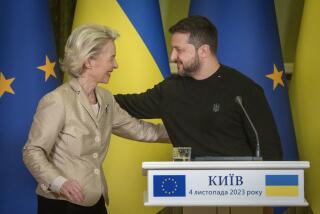An Insider/Outsider Europe
French President Jacques Chirac, in a rousing speech to the German parliament last week, called for the creation of a Europe within Europe, a bloc of âpioneeringâ countries that would draw up its own constitution and spearhead the creation of a political and economic union. The vision of a pan-European confederation--vague as it still is--has already propelled the 15-nation European Union toward ever-closer cooperation. But this is an awkward time to propose creating a two-speed Europe, with some countries at its core and others on the fringes. The EU is expanding eastward, negotiating accession treaties with most of the former Communist bloc countries. Completing the enlargement process and integrating those countries into the EU should be its top priority.
Since the demise of communism in Europe in 1989-90, most countries of Central and Eastern Europe have focused their policies on gaining EU membership. Despite domestic hardship, countries from the Baltic Sea to the Balkans have been rewriting their laws and overhauling economic policies to comply with EU rules.
The EU has been imposing strict conditions and setting tight deadlines. And it has not been slow to criticize or even punish laggards. For example, the struggling Slovakiaâs membership in the Organization for Economic Cooperation and Development was blocked last week only because it didnât sign onto the EUâs rules limiting non-European content on domestic television. At the same time, the EU refuses to commit itself to a deadline for admitting the newcomers.
That is not to say the applicant countries arenât benefiting from the accession process. The EU pressure is forcing them to adopt much needed reforms. Moreover, the EU is spending generously helping those countries adjust to EU norms.
But Chiracâs speech--which echoed a similar theme delivered by German Foreign Minister Joschka Fischer a month ago--raises the justifiable fear that the applicant countries will be joining the EU as second-class citizens, relegated to the margins of European integration. Some EU member countries themselves are beginning to worry about being sidelined.
It may well be that creating a multi-system Europe is in the Continentâs long-term interests. Already, 11 of the 15 member countries have joined the European Monetary Union. But the 13 applicant countries should be admitted into the EU fold first so they can take part in the debate as fully fledged members. To that end, the EU should first amend its rules--such as those on voting within the governing Council of Ministers and on the size of its executive commission--to make an EU of 28 countries governable. It should then complete accession negotiations with the applicant countries.
A united Europe, committed to the NATO alliance, is in the United Statesâ interest. One that builds at one end and unravels at the other is not.
More to Read
Sign up for Essential California
The most important California stories and recommendations in your inbox every morning.
You may occasionally receive promotional content from the Los Angeles Times.










